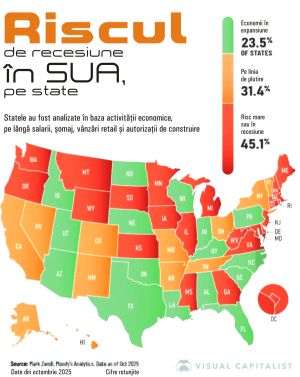The government's proposal to transfer the social security contributions exclusively to the employee is not at all a social-democratic measure and not even one of redistribution, rather it is one of an ultra-liberal nature, which leaves the employer in the unique position in Europe of not contributing in no way whatsoever to the social security systems (retirement and unemployment) or healthcare. When in the current and the future Fiscal Code (which was passed yesterday through an emergency ordinance, going against any predictability rule), labor is still harshly taxed (out of a full salary, the employee only gets 57.14%, and the state gets 42.86%, meaning almost half), and capital is taxed very "softly" (10% profit tax, 0%-5% dividend tax and 0% for amounts returned to shareholders from capital contributions), the ultra-liberal nature of this Code becomes obvious.
Business owners, small, big or transnational aren't making money in Romania out of thin air, nor it is their own exclusive merit if they do or the result of their goodwill, but by climbing on the shoulders of society, a community on whose infrastructure and resources they rely to make a profit and which they often export in order to avoid paying taxes, to off-shore countries.
And nevertheless, a government which claims it is a social-democratic one, exempts all business owners of any contribution of solidarity with the community they make a profit in, and taxes them "competitively" for the capital gains, so competitively, that all the major players in the economy practice tax optimization (which has been tolerated so far by every government), to avoid paying even those minimal capital taxes here, where added value is created, on the back of this community of workers and robots which we call, in what looks a cynical ploy, citizens.
In the long run, this measure could prove disastrous, including for the major players in the economy (who seem to come out of the "Atlas Shrugged" novel by American Ayn Rand, in which a number of large industrialists shut down their factories only to show society that it needs them more than they need it). Because a system of taxes and social security contributions is used for, among other things, to build and maintain communications pathways and other elements of critical infrastructure, to train future workers, to pay the law enforcement officers which guard properties and insure the safety of citizens, prison guards in which the corrupt and tax evaders get "hosted", plus the other criminally convicted, and to pay soldiers and firemen who would defend the community, plus the contribution to the NATO arming expenses, plus the contribution to the EU budget, all of the above being used first of all by employers to create added value. In the absence of this system of joint financing or in the event of its serious weakening, turning out a profit will no longer be possible.
On a different note, I want to note the strange, oscillating stance of the mainstream economic analysts, of the consultants from the major multinational audit and consulting firms, of the associations of businesspeople and particularly, of the NBR and of the presidency, who are all right-wingers, and who are sabotaging the draft to amend the Fiscal Code. The current Fiscal Code, the one in effect, is the result of another massive (and insufficiently thought out) change, made by the Ponta government, in 2015. The NBR opposed this Code strongly back then, even resorting to the touchy argument of "severe systemic risk", to draw the people's ire and the criticism of the president. That argument seemed to be used just like the Turks would raise the green banner to boost morale when they would be losing a battle, because at the time, the "war" of the NBR with the government seemed to have been lost. The president already refused once to pass this Fiscal Code. Analysts criticized (and justifiably so, as a matter of fact) that Code, in unison. But now, all of them, without exception, claim that the change proposed by the current government is so seriously wrong, that the "#resist-ers" should take to the street. Implicitly, but undoubtedly, the current Code, the one with the systemic risk, the one which saw its promulgation refused, the mega-criticized one, is good. Just like in the case of the laws on justice, which the current government dallied on for a long time, as did the parliamentary majority, which make the current laws, plus the criminal and criminal procedure code be considered by default good for the independence of the judiciary, even though the Constitutional Court slammed them, and the previous government changed them through an Emergency Government Ordinance. What are all these influencers and decision makers afraid of? Of the increase of the salary costs for employers? You will see below, however, that this concern is without merit.
Besides, the unions, who in turn have taken their members to the streets, are worried about a drop in the net wage of the employees, a concern which, as may be seen below, is also without merit. In reality, unions should be worried about the things described earlier. Over the long term, the cohesion between employee-employer-union-state in their effort to support the state-owned social security system can be irreparably compromised.
Using a web-based software (it's www.called calculator-salarii.ro (wage calculator), which is available to anybody and easy to use, I have calculated, in several iterations, that no matter how big the net wage would be, the total employer's cost would not increase,(but would instead decrease) and thus, the drop of the net wage does not have basis in arithmetic. Besides, the drop of the net wage wouldn't even have any legal basis, because the salary is an element of a contract, the labor contract, specifically, and a contract may only be changed through the parties' agreement or for reasons stipulated in the legislation. The labor contract includes the gross wage, but what is really negotiated is the net wage (note: perhaps this entire debate will also have an upside, because through it, the employee will have learned to also negotiate the gross wage, because the existence and the amount of the social security contributions depend on it, contributions which, whether we like it or not, we all need at one time or another). Or, it would be illegal for the business owner to change the gross/net wage without the agreement of the employee or without a legal provision that allows them to do that.
At the risk of boring those readers who are not interested in numbers and economics (just like I wasn't until five years ago ...), I want to present one iteration, based on the aforementioned web software, as well as on net wages which have been rounded up to allow for easier comprehension:
(i) a net wage of (NW) of 2000 lei a month, in 2017, involves a gross wage of (GW) of 2841 lei and a total cost for the employer (TCE) of 3487 lei; in 2018, those numbers will go to 3409 lei (gross /full salary, GS/C) and 3486 lei TCE; thus, the net wage doesn't decrease, the TCE doesn't increase, in fact it decreases by 1 leu;
(ii) a NW of 5000 lei in 2017 means a GW of 7128 lei and TCE of 8751 lei; in 2018, the GS/C becomes 8548 lei, and the TCE 8740 lei (NW remains stagnant, the TCE decreases by 14 lei);
(iii) a NW of 10,000 lei in 2017 means a GW of 14257 lei and a TCE of 17500 lei; in 2018, it means a GS/C of 17093 lei and a TCE of 17478 lei (NW remains stagnant, TCE decreases by 22 lei);
(iv) a NW of 30,000 lei in 2017 means a GW of 42,771 lei and a TCE of 52502 lei; in 2018, it means a GS/C of 51281 lei and a TCE of 52435 lei (NW remains stagnant, TCE decreases by 67 de lei);
(v) a NW of 100000 lei a month in 2017 means a gross wage of 142572 lei a month and a TCE of 175007 lei a month; in 2018, it means a GS/C of 170940 lei a month and a TCE of 174786 lei a month (NW remains stagnant, CTA decreases by 231 lei).
You may be wondering who the hell earns a net wage of 100,000 lei a month in Romania. Well, I think you know. Isărescu, Gheţea, van Groningen are they names that you know or not? These are wages that not only won't go down, but will be "reinforced", because they are protected by the Fiscal Code and the almost religious tolerance of the common folks for such salaries which the most admired managers "deserve" (salaries which I will, from now on, call "IGG salaries").
Thus, if we were to confine ourselves to these iterations only, (which I haven't made up, they are simply the result of the salary calculator I was telling you about), it clearly follows that there is no way that the net wage would decrease by 20-23%, like some professional associations and unions are whining.
Furthermore, I would say that the software starts from a mistaken premise, because, once the social security contributions (less the bizarre solidarity tax of 2.25%) become the responsibility of the employee, they are no longer applied to the total employers' cost, but to the gross wage. Thus, when we apply the approximately 35% rate from the new Fiscal Code, we first extract 22.5% from the total cost of the employer, amount which was the responsibility of the employer, then we multiply everything by 35% and we get the additional amount which is added to the net wage. The resulting amount will be smaller than the ones shown in the iterations above.
It is worth adding that at least to my knowledge, the exemptions which apply to IT programmers and doctors remain in effect, as their salaries are not affected.
In the end, I have to remind you that I am NOT a voter or sympathizer of the PSD. And I definitely won't be one in the near or farther future. Given the blunders, the inconsistency and unpredictability that would kill any business, big or small, whether creditworthy or insolvent, as well as the unbelievable indecision when it comes to the laws concerning the judicial system and the amendments of the criminal and criminal procedure code, the fear of making the decision to dismiss the heads of the prosecutors' offices for their incompetence and abuses (consisting even of the violation of the Constitution), I would have no way of becoming a voter or sympathizer of the PSD. They don't deserve the trust.


























































